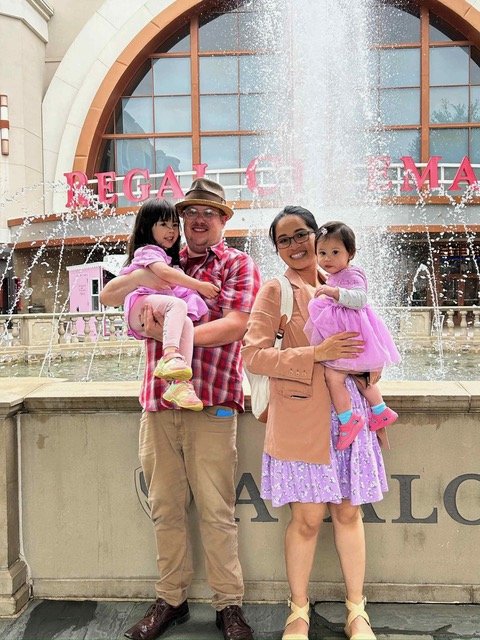“It’s an empty house without our children”
By: Conner Drigotas
“I’ll never forgive this state.”
When Matthew Hernandez brought his daughter to the Children’s Hospital of Atlanta to have her leg looked at, he never imagined that the visit would result in his family being splintered.
Matthew, his wife Wilairat, and their two kids, Emma and Arya, had gone to the hospital at their pediatrician’s recommendation to get a closer look at Emma’s leg, which couldn’t be diagnosed without an x-ray. Later that day the hospital called police and the Georgia Department of Children and Families (DFCS), alleging parental abuse.
Matthew and Wilairat allege that police who arrived interrogated Wilairat without reading her rights or providing a needed interpreter, then removed both of Matthew’s children and forbade him and his wife from seeing each other until an allegation of child abuse could be sorted out. Matthew says doctors “decided what the story was and ran with it,” and denies that any abuse occurred.
When he spoke with Respect America, more than two years after the hospital visit, Emma and Arya were still not home, and the allegations of DFCS bungling the situation had continued to pile up.
Matthew says that state officials have lied, abused their power, made outlandish legal arguments, and acted against the best interest of these young children - and that the battle has cost his family the chance at a secure financial future.
Mandated reporters, abuses of power
In Georgia, certain professions are required to make a report if they have “reasonable cause to believe that suspected child abuse has occurred.” These professions include physicians, hospital or medical personnel, dentists, podiatrists, and teachers, among others.
Matthew says doctors have pressure put on them “to protect their medical license,” but that it also leads to overreporting and, subsequently, intense scrutiny of families from state officials with every incentive to find wrongdoing.
Though mandated reporting is a process created with the best of intentions, involving state officials is far from a guarantee of safety. Department of Children and Families employees in states across the country have been found to have neglected, exploited, raped, lost, and trafficked the children they were charged with protecting, among many other abuses.
Georgia DFCS officials appear to be willing to use force to protect their monopoly and cash flow, even going so far as to punish those who step out of line. In the fact-checking process, Respect America also spoke with Jennifer Williams, one of the temporary foster parents for Arya and Emma. Shortly after testifying to her belief that Arya and Emma were not abused, DFCS revoked her foster care license of 13 years in what she described as an act of retaliation.
Aside from Jennifer’s testimony in October, Matthew describes June to December of 2023 as having few rays of hope. He learned that the breastmilk Wilairat had been diligently pumping and providing to state officials never made it to his youngest daughter. Without parental consent, Arya was switched to a manufactured formula, and the breastmilk had presumably been dumped down the drain. He was angry and powerless. “It’s all blurred into one big depressing moment,” Matthew says.
On top of their continued persecution of the Hernandez family, state officials aren’t meeting their obligations. Matthew and his attorney keep waiting for a DFCS case plan to offer some transparency, which is supposed to be delivered within 30 days. Matthew says it didn’t materialize for more than seven months after the children were taken from him, further contributing to his stress during this time.
The one bright spot is the four hours a week Matthew is allowed to spend with his daughters. A mere 2% of his increasingly complicated and expensive life.
By the end of 2023, Matthew was running out of money, having racked up $100,000 in out-of-pocket costs and credit card debt fighting to reunite with his wife and kids. Bail, criminal and family court attorneys, medical experts, and the continued cost of living were piling up.
The dreams the Hernandez family was working toward before the hospital visit have been relegated to a distant dream. “Our goal, before all this happened, was to save money to get a house in a good school district,” Matthew says, “that’s impossible for us now. We’ll never own a house in this country.”
Cash Court
Throughout this separation, the slow wheels of justice begin to turn. Winning feels impossible. Matthew struggles with anxiety and depression as he paces around the wood-paneled house filled with unused children’s toys and his wife’s belongings. In the Georgia heat, he sweats, cries, and sits in long periods of silence, contemplating whether justice is being served.
The state attorneys and DFCS have a clear and stated goal: they have moved Emma and Arya from a series of temporary foster families to a “foster to adopt” home where state officials hope to permanently separate Matthew and his wife from their children. The girls have multiple relatives who have volunteered to open their homes in Chicago and Myrtle Beach, but Matthew says DFCS told Matthew an Interstate Compact on Placement of Children (ICPC) wasn’t possible.
“They tried to terminate our parental rights twice… they just said, ‘we’re not going to do a damn thing to reach out to these families, we’re going to put [the kids] in a foster to adopt family right now… its insanity, and it continues.”
Georgia juvenile court suffers from an evidentiary structural problem that contributed to Matthew’s uphill battle. According to State Code 15-11-210 (2020) “The court may consider any evidence, including hearsay evidence, that the court finds to be relevant, reliable, and necessary to determine the needs of a child adjudicated as a dependent child and the most appropriate disposition.”
In other words, the taxpayer-funded DFCS staff, legal officials, and advocates against reunification are given a wide berth to use evidence that would be inadmissible in most other courtrooms. “Because hearsay is allowed in juvenile court, it's very frustrating that they abuse the fact that they can say things without having evidence, and it's allowed,” Matthew says.
Though beyond the scope of this article, there are also open questions about the financial incentives for doctors, judges, Guardians ad Litem (GALs), and Georgia, in the form of federal money and payouts, to create and prolong cases. According to Ryan Ralston, the Southeast Regional Organizer for You Are the Power, a nonprofit group working to help reunite the Hernandez family, Georgia received $150 million in federal funding related to adoption services in 2023.
Matthew says the nature of the system should be questioned, as agency has been improperly delegated with ruinous results: “It was surreal and very scary, and ridiculous…all I could think about was, what state is this? What country is this that you have two parents with no criminal history at all who bring their child to the hospital on their own, just to be treated like monsters?”
The Next Chapter
Amid the stress and uncertainty, though, something positive happens. There is a small break in the barrier that has been constructed between Matthew and his family by errant doctors, law enforcement officials just following orders, and a cumbersome judicial system.
“The first breath of fresh air we really got was when the juvenile judge denied the non-reunification plan,” Matthew says, “basically, she had heard so much testimony about the strong bond I have with my daughter Arya that she couldn’t do it [continue with DFCS’s foster to adopt plan].”
In other words, a clearer path to reunification started to emerge, with real concrete steps to success. Then, in April 2024, Matthew and his wife were reunited, ending 10 months of separation and allowing them to launch a united front against the DFCS custody of their children.
“It was great to know we were at least going to get the chance to fight to get our girls back.” Matthew says, “If DFCS had their way, they weren’t even going to get us that opportunity.”
Though there are still unresolved legal matters to handle, not the least of which are the criminal allegations of abuse, the process of bringing the family back together has begun. “We don’t really have a timeline.” Matthew says, “We don’t know when this whole nightmare ends, to be honest.”
Now on a path toward reunification, Matthew has an eye toward making sure his is one of the last stories of its kind. He believes that Child Protective Services needs to exist in some form to catch the “monsters out there,” but wants to see hospitals and other mandated reporters exercise caution: “We hope to raise awareness.” he says, “We hope these hospitals realize that when parents come in with children, you should do your jobs, run the actual tests, do your due diligence before you rip apart a happy family.”
For now, Matthew’s most important step is the next one. When he spoke with Respect America, he and his wife were just hours removed from the court ruling that got Emma and Arya out of foster care. “Today is a big win for us, because DFCS has closed their case, and the girls are going to go back with their aunt and uncle.”
His house is only half full, and that is the way Matthew is viewing life's proverbial glass. As the interview concludes, Matthew looks at the camera and despite the sweat, the evident stress, and the acknowledgment of a long road ahead - his voice has an upbeat energy as he considers the load that has been lifted from their shoulders, “For the first time in a long time,” he says, “we can get some sleep.”





